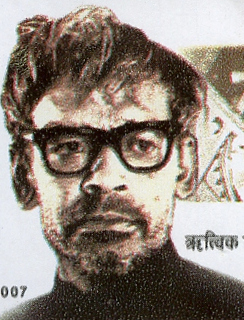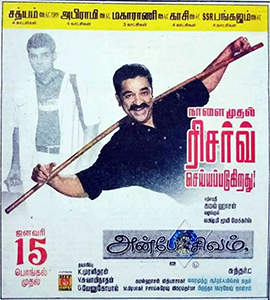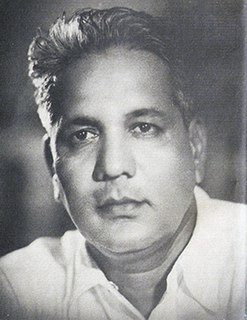
Silsila is a 1981 Indian romantic drama film directed and produced by Yash Chopra. It stars Amitabh Bachchan, Jaya Bachchan and Rekha, with Sanjeev Kumar, Shashi Kapoor and Kulbhushan Kharbanda in supporting roles. On his last birthday, Yash Chopra revealed that he had originally signed Smita Patil and Parveen Babi opposite Bachchan, but after consulting with him, he cast Jaya Bachchan and Rekha in their respective roles. Padmini Kolhapure revealed in an interview that she had also been considered for the role of Chandni, but Amitabh had considered her too young to star opposite him, she was only fifteen then.

Vijay Dhondopant Tendulkar was a leading Indian playwright, movie and television writer, literary essayist, political journalist, and social commentator primarily in Marāthi. He is best known for his plays Shantata! Court Chalu Aahe (1967), Ghāshirām Kotwāl (1972), and Sakhārām Binder (1972). Many of Tendulkar's plays derived inspiration from real-life incidents or social upheavals, which provide clear light on harsh realities. He has provided guidance to students studying "play writing" in US universities. Tendulkar had been a highly influential dramatist and theatre personality in Mahārāshtra for over five decades.

Ritwik Kumar Ghatak was a noted Indian film director, screenwriter, and playwright. Along with prominent contemporary Bengali filmmakers Satyajit Ray, Tapan Sinha and Mrinal Sen, his cinema is primarily remembered for its meticulous depiction of social reality, partition and feminism. He won the National Film Award's Rajat Kamal Award for Best Story in 1974 for his Jukti Takko Aar Gappo and Best Director's Award from Bangladesh Cine Journalist's Association for Titash Ekti Nadir Naam. The Government of India honoured him with the Padma Shri for Arts in 1970.

Smita Patil was an Indian actress of film, television and theatre. Regarded among the finest stage and film actresses of her times and one of the greatest film actresses of all time, Smita Patil appeared in over 80 Hindi, Marathi, Gujarati, Malayalam and Kannada films in a career that spanned just over a decade. During her career, she received two National Film Awards and a Filmfare Award. She was the recipient of the Padma Shri, India's fourth-highest civilian honour in 1985. She made her film debut with Shyam Benegal's Charandas Chor (1975). She became one of the leading actresses of parallel cinema, a New Wave movement in India cinema, though she also appeared in several mainstream movies throughout her career. Her performances were often acclaimed, and her most notable roles include Manthan (1977), Bhumika (1977), Jait Re Jait (1978), Aakrosh (1980), Chakra (1981), Namak Halaal (1982), Bazaar (1982), Umbartha (1982), Shakti (1982), Arth (1982), Ardh Satya (1983), Mandi (1983), Aaj Ki Awaaz (1984), Chidambaram (1985), Mirch Masala (1985), Amrit (1986) and Waaris (1988).

Anbe Sivam is a 2003 Indian Tamil-language comedy-drama film directed by Sundar C. and produced by K. Muralitharan, V. Swaminathan and G. Venugopal under the banner of Lakshmi Movie Makers. The film was written by Kamal Haasan, and Madhan provided the dialogues. Anbe Sivam stars Haasan, Madhavan and Kiran Rathod, with Nassar, Santhana Bharathi, Seema and Uma Riyaz Khan playing supporting characters. The film tells the story of Nallasivam and Anbarasu, two men of contrasting personalities who undertake an unexpected journey from Bhubaneswar to Chennai.

Govind Nihalani is an Indian film director, cinematographer, screenwriter and producer, known for his works in Hindi cinema. He has been the recipient of six National Film Awards, and five Bollywood Filmfare Awards. In 1996, his script for Drohkaal was adapted by Kamal Haasan for its Tamil remake, Kuruthipunal, which subsequently became India's official entry for the 68th Academy Awards Best Foreign Language Film category.

Dr. Jabbar Patel is a Marathi-language theatre and film director of India. His production of the play Vijay Tendulkar's play Ghashiram Kotwal, in 1973 is considered a classic in Modern Indian Theatre.

Subhash Mukhopadhyay was one of the foremost Indian Bengali poets of the 20th century. He is also known as the "podatik kobi" in the field of Bengali literature. A book of thirty of Subhash's best known poems in English translation, titled ' As Day is Breaking', was published in 2014 by Anjan Basu, a Bangalore-based writer/critic. The book includes a rather detailed introduction to the poet's work as well. He was honoured with Jnanpith Award in 1991.

Saurabh Shukla is an Indian film, theatre and television actor and director. He is famous for his roles in Satya (1998), Yuva (2004), Barfi! (2012), Jolly LLB (2013), Kick (2014), PK (2014), Jolly LLB 2 (2017) and Raid (2018). He has also worked in a short documentary with Ruth Agnihotri and Rachael Agnihotri in Goa.

Dance Dance is an Indian Bollywood dance film released on 15 May 1987, directed and produced by Babbar Subhash. The film is a musical and stars Mithun Chakraborty, Smita Patil, and Mandakini in lead roles. It also stars Amrish Puri, Shakti Kapoor, and Om Shivpuri in supporting roles. It is about a brother and sister who try to find success and become big singers.

Pallavi Subhash Shirke is an Indian film and television actress. A Maharashtrian model turned actress, she began her career in Marathi plays, films and TV shows, then appeared in Hindi TV shows. She worked in various Telugu, Kannada, Marathi films and a Sri Lankan film too. She is the only Marathi actress who has worked in not only all south Indian languages such as Telugu, Tamil, Malayalam and Kannada but also in Sinhala language. She is disarmingly warm and dignified as Dharma in Chakravartin Ashoka Samrat, and received the Golden Petal Award in 2016 for the same. She had been nominated several times for her portrayals and earned the Dadasaheb Phalke Award. As the lead actress of the Sri Lankan film Bimba Devi Alias Yashodhara, she presented the Distinguished Achievement Award at the Gala Dinner and Awards night for her contribution to the film.
"Jai Ho" is a song composed by A. R. Rahman for the 2008 film Slumdog Millionaire. When Danny Boyle, the director of Slumdog Millionaire, approached Rahman to compose its soundtrack, he included the song. "Jai Ho" accompanies a choreographed dance sequence at the end credits of the film. Indian singer Tanvi Shah wrote and provided vocals for an English section of the song. "Jai Ho" is a phrase which can be roughly translated as "Let [the] victory prevail", "Let there be victory", or "May there always be victory".

Prateik Babbar is an Indian film actor, who predominantly appears in Hindi language films, and has also acted in a Tamil movie. The son of late actress Smita Patil and actor Raj Babbar, he began his career as a production assistant before pursuing an acting career. Prior to his screen debut, Babbar appeared in television advertisements for a variety of products, including NestleKitKat, on the recommendation of the filmmaker Prahlad Kakkar. Since his debut in Bollywood, Babbar has received accolades such as a Filmfare Award and a Stardust Award.

Dinkar D. Patil (1915–2005) was a prominent Marathi film director, scriptwriter, and dialogue writer during the Golden Era (1950–1990) of the Marathi Film Industry. He directed, wrote scripts and dialogue for more than 60 Marathi films. He also directed two Hindi Films-Mandir and Gharbar. He wrote his famous autobiography titled as Patlache Por.

22 June 1897 is a 1979 Marathi film co-written by Shankar Nag and Nachiket Patwardhan and directed by the husband and wife team of Jayoo Patwardhan and Nachiket Patwardhan. The duo are also practising architects. It is based on the true life story of the assassination of British Government officers Walter Charles Rand ICS and Lt. Charles Egerton Ayerst. The film has been included in the book One Hundred Indian Feature Films: An Annotated Filmography, a representative selection from the first Indian talkies to the then-present date (1988). The title of the film is the date of the assassination, 22 June 1897. It won the 1980 Indian Silver Lotus at the National Film Awards in two categories: Best film on National Integration and Art Direction. It also won the 1980 Maharashtra State awards for best film of the year and best director. The film has been included in the selected collection of Indian films and videos in the US Library of Congress. Most of the performers in the film then belonged to Theatre Academy, Pune.

Drishti (transl. Vision) is a 1990 Indian Hindi-language drama film directed by Govind Nihalani, starring Dimple Kapadia, Shekhar Kapur and Irrfan. The film depicts the marital life of an urban couple from an upper-class milieu in Mumbai and follow their trials and tribulations, infidelity, divorce, and meeting after years of separation.

Umbartha is a 1982 Indian Marathi-language film produced by D. V. Rao and directed and coproduced by Jabbar Patel. The film is a story of a woman's dream to step outside her four walled home and bring change in the society. Smita Patil played the lead protagonist in the film for which she won Marathi Rajya Chitrapat Puraskar for Best Actress. The film was adjudged as the Best Feature Film in Marathi at the 29th National Film Awards for "a sincere cinematic statement on the theme of a woman seeking to establish her identity by pursuing a career, even at the risk of alienation from her family".
Shivajirao Girdhar Patil was an Indian social activist and politician from the state of Maharashtra. He began his social activism at an early age when he took part in the independence movement. Post-independence, he has been associated with various political parties and has been member of Maharashtra Legislative Council, Maharashtra Legislative Assembly and later also of the Rajya Sabha for one term. Recently in 2013 he was presented with Padma Bhushan; India's third highest civilian award. He is father of the late film actress Smita Patil.
The Smita Patil Memorial Award for Best Actress is an honour established in 1986 by the Priyadarshni Academy in memory of actress Smita Patil. It is awarded every other year to an Indian actress for her contribution to Indian cinema in the period prior to the ceremony, irrespective of a particular performance.















